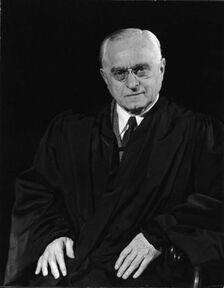On Frankfurter – Jeffrey Rosen in NYT:
‘That’s to Snyder’s credit, but not always to Frankfurter’s: His lack of self-awareness and failure to produce memorable judicial opinions make him a less than compelling advocate for his own case. By the end of the book, the reader feels like Frankfurter’s wife, Marion, who told a law clerk: “Do you know what it’s like to be married to a man who is never tired?” Frankfurter first developed his views as a student at Harvard Law School, where Professor James Bradley Thayer had argued in an 1893 essay that judges should not strike down laws unless they were unconstitutional “beyond a reasonable doubt.” As a founding contributor to The New Republic in 1914, he became one of the Taft court’s leading critics. The court should not strike down “social legislation” like the minimum wage law in Washington, D.C., Frankfurter unsuccessfully argued before the justices in 1923. Instead, he believed the court should prohibit only “unreasonable” racial and religious discrimination, such as that faced by Frankfurter’s clients Sacco and Vanzetti, Italian anarchists executed on murder and robbery charges in 1927.’
(…)
‘According to Snyder, although Frankfurter claimed not to be swayed by his personal views, his “obsession” with national unity during wartime was, in fact, influenced by his “second job as an informal executive branch adviser.” The book’s accounts of Frankfurter’s personal experiences with antisemitism during the war are memorable: A Nazi newspaper called his nomination a sign that Roosevelt had “become a handy man for world Jewry.” Yet while firsthand accounts of the Holocaust took Frankfurter’s breath away, Roosevelt refused to take them seriously.
In cases involving racial discrimination, Frankfurter did make an exception to his general unwillingness to challenge Congress, the states and existing Supreme Court precedent. (In this regard, he was more progressive than Holmes and Brandeis.)
He played a leading role behind the scenes in the court’s historic 1954 decision in Brown v. Board of Education, which overturned Plessy v. Ferguson and struck down racial segregation in public schools. Frankfurter’s most important contribution was persuading other justices to delay a decision for nearly a year so that they could win over the undecided justices. After the unexpected death of Chief Justice Fred Vinson (which Frankfurter waspishly called “the first solid piece of evidence I’ve ever had that there really is a God”), his successor, Earl Warren, helped make the decision unanimous.
Brown was momentous, but its implementation was slow: Frankfurter believed that the institutional legitimacy of the court was more important than the immediate enforcement of the Constitution. Controversially, he persuaded the court to delay striking down bans on interracial marriage for more than a decade after Brown. In Frankfurter’s view, allowing desegregation to proceed slowly — “with all deliberate speed,” to use a famous phrase he persuaded the court to adopt — would allow moderate voices in the South to build support for integration over time.
In 1962, months before he resigned from the Supreme Court, Frankfurter dissented from Warren’s 6-2 opinion in Baker v. Carr, which Warren considered the most important case of his tenure. Frankfurter warned his colleagues to stay out of the business of striking down partisan gerrymanders, predicting that the court would have no clear standard for deciding election cases once they entered what he had memorably called in 1946 “the political thicket.” Subsequent Supreme Court cases involving contested elections, from Bush v. Gore in 2000 to our upcoming fights in the court this term over the “independent state legislature” doctrine, have vindicated Frankfurter’s prediction.’
Read the article here.
A modest and incremental approach to judging, to politics in general I would say, sounds just right to me.
Revolution works much better in novels and opera than in reality.
But alas, reality imitates art. The results are not always convincing.
